Seven Holy Mysteries
God acts in creation through the Holy Mysteries
The psalmist says, “it is time for God to act” (Ps. 119.119). No better time than now to meet God in the Holy Mysteries. Moreover, in the Holy Mysteries we come to know and love God and what He does in history. What Eastern Christianity calls the Holy Mysteries the Western Latin Church, calls sacraments. At the beginning of the Byzantine Divine Liturgy you will hear the prayer of the Church speaking of the spirit of God being “present in all places and filling all things.” There is no easier way to think of God’s relationship to humanity and to the created world than thinking, knowing and experiencing the presence of the Trinity “in all places and filling all things.”
The corporate life of the Melkite Church perceives, she feels, she knows, and she sensually experiences the presence of God —Father, Son and Holy Spirit—in word, gesture and created things. The Church believes that in word, gesture and created matter God discloses —reveals— Himself to us so that we might be brought closer and closet to Him. This disclosure, this relationship is also a Theophany and is known concretely to be the Mysteries or the sacraments of the Church. The theology of the Church, that is, the relationship that the faith community has with God, believes that the all of the Mysteries (the Sacraments) affect in a deep way our personal relationship to God, to self and to one another.
The Mysteries, therefore, are the doors by which we pass through in order to meet Jesus whom we hear in the Gospels who in turns brings us closer to God through the giving of the gifts of the Holy Spirit. This we call deification, or theosis. The idea of theosis is key in Eastern Christianity.
The Mysteries of the Melkite Catholic Church are composed of prayers, hymns, scripture lessons, gestures, material things like water, light, oil, bread, wine, and processions —much of which is linked to the time of the Apostles and to the experience of the early Church.
The Mysteries are not a reduction a particular formula or action, something magical. We think in terms of the whole: a series of sacred words and actions make up a Mystery. Material of creation communicates the outward and visible sign of God’s revelation: bread, wine, water, oil, light, wind are but a few of the many elements which the Catholic Church employs in her worship. The created world reveals, discloses, reminds us of God as creator. Further, created matter affirms the truth, beauty and goodness of the creation because it centrally affirms truth of Catholic faith: God became flesh in Jesus of Nazareth and entered into creation thereby directing the cosmos toward its vocation to glorify her Creator.
The Mysteries of Baptism
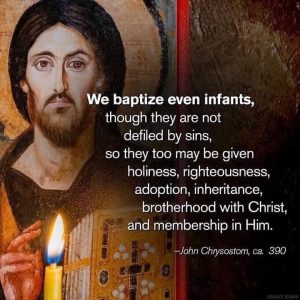 Baptism in the Melkite Greek Catholic Church is known as the Mystery of Illumination and is always accompanied by the reception of Holy Communion and Chrismation (Confirmation). What do we believe about this Holy Mystery?
Baptism in the Melkite Greek Catholic Church is known as the Mystery of Illumination and is always accompanied by the reception of Holy Communion and Chrismation (Confirmation). What do we believe about this Holy Mystery?
- By this Mystery the person is initiated into the Christian community, the one, holy, catholic and apostolic Church founded by Jesus Christ. Thus, each person receiving this Mystery becomes a member of God’s household, part of God’s family –that is, a new family, one that is beautiful, loving and reasonable; we come to understand that we are adopted children of God, brothers and sisters in Jesus Christ.
- Baptism bestows upon the person the treasure of divine life, the promise of communion with God, igniting a sense of true freedom proper to being created in the image and likeness of God.
- The baptized person is entrusted with and to the truth, goodness, beauty of God, who is a source of light and love. By Baptism we are born into a “new life”, who protects and defends the baptized forever against all evil.
Baptism, Chrismation and Holy Eucharist —all three Sacraments are given by a priest, and always in the same ceremony. The ancient tradition, as one of the Melkite priests explained, “is communion as a baby when you’re baptized, but that changed over the centuries in the west. In the east, in the lands of Christ in the middle east, communion is at baptism. You get baptized, you receive the sacrament of confirmation, and you receive the Eucharist all in the same day as an infant.”
The tradition in the Melkite Church is to receive Baptism as an infant. The sacrament is celebrated in the church (unless it is an emergency baptism) in the presence of at least one godparent/sponsor. The recommended age is 3-6 months. The baptismal service usually takes 45mins-1 hour.
The godparent must be a baptized Melkite Catholic in good standing (having had a recent Confession and received Holy Communion), and who is practicing Melkite person worshipping each Sunday in church. In many cases more than one godparent is chosen for the infant. The central role of the godparent is to speak on behalf of the child, rejecting Satan and confessing their faith in Jesus Christ as his or her Lord and Savior, making a profession of faith (i.e., reading the Nicene-Constantinopolitan Creed) and be a spiritual guide to the child in the Orthodox faith. Sometimes there is an “Honorary” witness (Orthodox or not) who are welcome to participate and assist, but they are not the child’s baptismal godparents.
Adults who want to be received into the Melkite Catholic Church are expected to undergo a period of catechesis (a period of time learning the faith). The period of time and schedule are discussed with the priest, who will advise on how the catechumen/candidate for baptism needs to prepare. The priest will determine whether the catechumen is to be received through Baptism and Chrismation or Chrismation alone. Typically, rebaptism is not required and the candidate is received through the Sacrament (Mystery) of Chrismation (the anointing with the Holy Chrism or Myrrh). One Melkite Catholic godparent in good standing is required and will become a guide/provide support for the newly received member of the Church.
Preparation to receive the Holy Mysteries is required –please speak to Father Dennis.
***The Melkite Church does NOT have a “First Communion” ceremony because the Holy Eucharist is given at the time of baptism and the person (the child) continues to receive the Eucharist afterward.
The Mystery of Crowning (Marriage)
Couples must contact Father Dennis at least six months prior to the desired date of the wedding. To initiate the marriage preparation process or if you have questions for weddings taking place at Saint Ann’s.
The Mystery of Reconciliation (Confession)
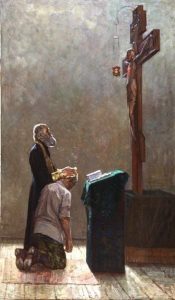 “Receive the Holy Spirit. For those whose sins you forgive, they are forgiven; for those whose sins you retain, they are retained” (John 20:23)
“Receive the Holy Spirit. For those whose sins you forgive, they are forgiven; for those whose sins you retain, they are retained” (John 20:23)
These words of sacred Scripture reveal to us that through Jesus’ life, death and resurrection reminds us of the fundamental gift of our redemption and the power given to the Church to forgive sins. The Sacrament of Confession bestows on us the gift of having our sins forgiven, reconciling us with God and with others.
Faith, reason and experience tells us there is no sin that cannot be forgiven. Our approaching the throne of mercy with humble and contrite hearts is an incredibly beautiful gift. No evil is more powerful than the infinite mercy of God.
The experience of the Church says that every confession is a liturgical act of faith, hope, and love for Jesus Christ. As one priest said, How can any priest not be moved by souls which humbly trust so much in God’s mercy, even as we are but the weak and imperfect instruments of this mercy? “If you forgive the sins of any, they are forgiven them” (John 20:23).
The Confession of Sin is offered prior to or following the Divine Liturgy on Saturdays and Sundays.
You may also make an appointment with Father Dennis to receive the sacrament.
For some theological thinking on the Mystery of Penance (Confession) you might want to read this essay, “Confession and Communion” by the late Father Alexander Schmemann, an Orthodox priest of the Orthodox Church in America (OCA) and scholar of the Liturgy. While he’s giving guidance to the OCA, the theology and pastoral practice is the applicable for the Melkite Church.
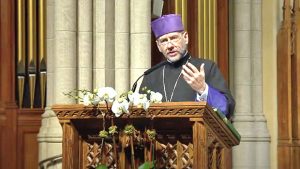 ***For those interested in hearing more about this Mystery of Reconciliation you ought to listen to this presentation by Armenian Orthodox Bishop Daniel Findikyan, “Returning to Normalcy and the Sacrament of Penance” (November 16, 2021). It is VERY worth listening to Bishop Daniel perhaps not once but twice. Even though he speaks in the Armenian perspective his thinking has deep consequences for all Christians, East and West.
***For those interested in hearing more about this Mystery of Reconciliation you ought to listen to this presentation by Armenian Orthodox Bishop Daniel Findikyan, “Returning to Normalcy and the Sacrament of Penance” (November 16, 2021). It is VERY worth listening to Bishop Daniel perhaps not once but twice. Even though he speaks in the Armenian perspective his thinking has deep consequences for all Christians, East and West.
His Grace Bishop Daniel Findikyan, former Primate of the Eastern Diocese of the Armenian Apostolic Church, delivered this 2021 Economos Orthodoxy in America Lecture which was sponsored by The Orthodox Christian Studies Studies Center of Fordham University.
The Mystery of Anointing (of the Sick)
The Mystery of Anointing of the Sick is routinely offered during the Divine Liturgy on Sunday or during pastoral visits by the priest to the hospitalized, the homebound and ill parishioners. The Mystery of Anointing is given to anyone who is seriously ill or grown more fragile with age. This Mystery is appropriate for someone preparing for surgery. If there is the slightest and remotest danger of death, the Sacrament ought to be given.
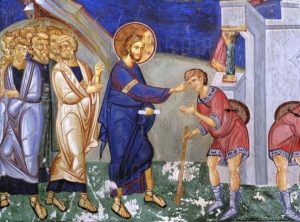 When we speak of The Last Rites, on the other hand, we understand that certain Mysteries (sacraments) are given in anticipation of one’s death. The Last Rites can include three Sacraments: Penance (Confession), Anointing of the Sick, and Holy Eucharist. Anointing within the context of the Last Rites is less for physical healing than it is for spiritual healing and strength as we prepare to meet the Lord of Life, Our Lord and Savior, Jesus Christ.
When we speak of The Last Rites, on the other hand, we understand that certain Mysteries (sacraments) are given in anticipation of one’s death. The Last Rites can include three Sacraments: Penance (Confession), Anointing of the Sick, and Holy Eucharist. Anointing within the context of the Last Rites is less for physical healing than it is for spiritual healing and strength as we prepare to meet the Lord of Life, Our Lord and Savior, Jesus Christ.
When possible, a Christian ought to receive the sacraments of Confession and Holy Communion before the time of their death. It is ill-advised to delay contacting the priest in the case of an impending death, so please do not hesitate to contact Father Dennis as soon as you are aware of such situation.
Please let Father Dennis know if you will be in the hospital or are at home and want a visit or have other special spiritual needs.
The Mystery of Holy Orders
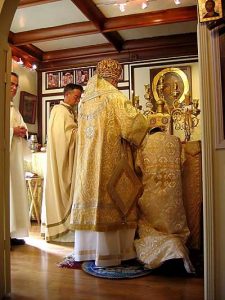 The Church and ministry of preaching the Good News of Jesus Christ, administering the Holy Mysteries (the sacraments) and thus saving souls ordered according to talent, need and Divine Grace: subdeacon, deacon, priest and bishop. Holy Orders is for the service of God and for the salvation of people imitating the priesthood of Our Savior, the Apostles and the saints.
The Church and ministry of preaching the Good News of Jesus Christ, administering the Holy Mysteries (the sacraments) and thus saving souls ordered according to talent, need and Divine Grace: subdeacon, deacon, priest and bishop. Holy Orders is for the service of God and for the salvation of people imitating the priesthood of Our Savior, the Apostles and the saints.
Cardinal Francis Arinze once said, “As to the origins of a priestly or religious vocation, only divine providence can fully analyze it” (N. Catholic Register, March 4-10, 2007). The belief and experience of the Church reveals that God works directly in the hearts and souls of men to call them and to help them respond generously to His call in the Mystery of Orders. The human dimension to every vocation for which we need to acknowledge and appreciate in the mystery of God’s call to ecclesial service, is the inspiring example of a holy priest, deacon and subdeacon.
Benedict XVI explained that in the final analysis, it is God who works in the deepest recesses of the heart to call forth vocations; the priesthood and religious life, Benedict says, are “not like other professions; we cannot simply recruit people by using the right kind of publicity or the correct type of strategy. The call which comes from the heart of God must always find its way into the heart of man. And yet, precisely so that it may reach into hearts, our cooperation is needed” (emphasis added).
For the Orders of Subdeacon and Deacon contact Father Bryan McNeil at
Brymc56@comcast.net
For the Order of Priest please contact our Father John Mefrige at (210) 628-9778 or vocations@melkite.org
For the monastic life (men and women), speak with either Father John or Bishop François.